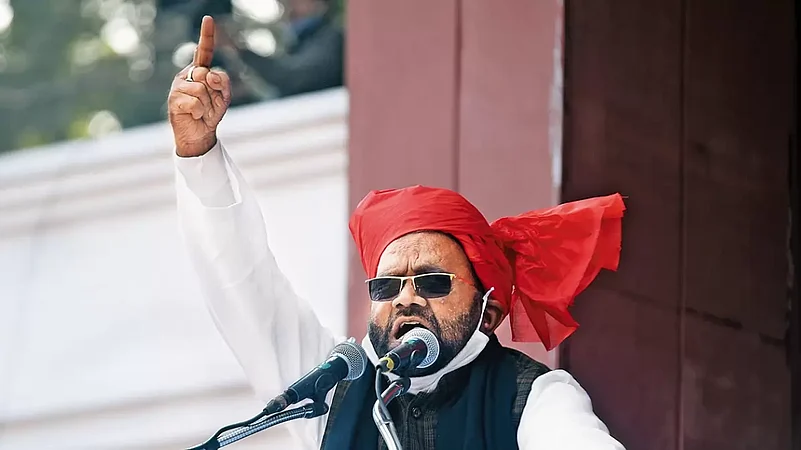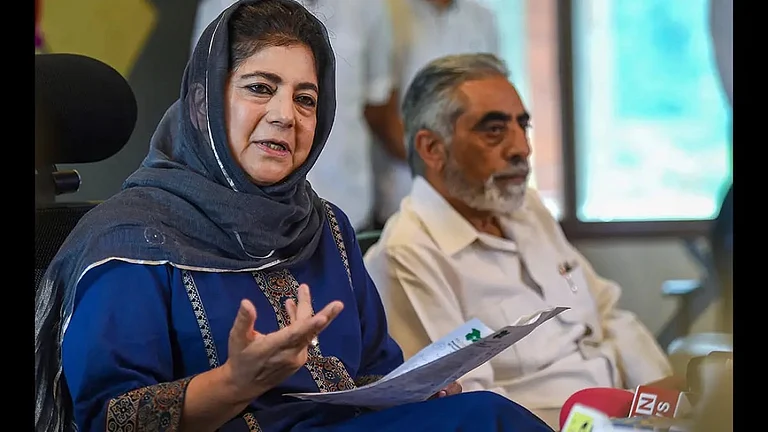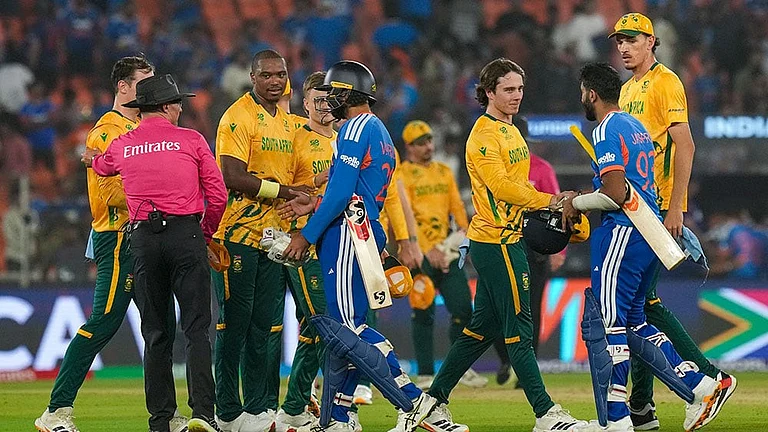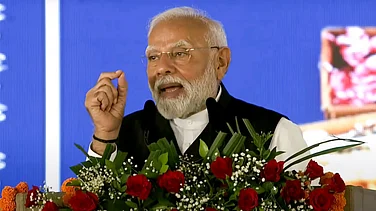The lobby of the high-end Taj Hotel in Lucknow was witness to some unsavoury scenes on February 15. The hotel was the venue of a conclave organized by a private television channel and among those invited as guests was Swami Prasad Maurya, a senior Samajwadi Party leader and Member of the Legislative Council in Uttar Pradesh. He is one of the tallest backward caste voices in the state and belongs to a community traditionally engaged in horticulture.
After concluding his session, while he was exiting the venue, Maurya got into a scuffle with Mahant Raju Das, a seer of Ayodhya’s famous Hanumangarhi temple. As the two physically jostled with each other for some moments, their vocal supporters too clashed with each other. Slogans of ‘Jai Shri Ram’ and ‘Jai Samvidhan’ were thrown at each other, as Maurya was escorted to his vehicle by his supporters.
A day later, Maurya, who had recently kicked up a storm over his demands that certain verses of the Hindu epic Ramcharitmanas by Tulsidas be edited out due to their caste and gender prejudice, alleged that this was an attempt on his life. In a letter to the Police Commissioner of Lucknow, Maurya alleged a major security lapse and claimed that the supporters of Das, who recently also announced a reward of ₹21 lakh for beheading Maurya over his controversial opinion, were armed with swords and axes. “The BJP government wants me murdered,” alleged Maurya at a press conference on February 16, accusing the state government of sheltering those threatening to kill him. He further alleged that people of a “varg vishesh” (specific community), “terrorists in the robes of sadhus,” were conspiring to kill him over his comments on the Ramcharitmanas. Despite the bounties declared on him by several right-wing seers, Maurya said he would continue to fight “till my last breath” for the honour of Dalits, backwards, tribals and women and not allow them to be humiliated as “neech” (lowly) and “adham” (vile) in the garb of religion. He claims these communities are depicted in the wrong light in the Ramcharitmanas.
In little over a year, Maurya has once again propelled himself as a major provocateur in the politics of Uttar Pradesh. The last time he occupied this space was in January 2022, weeks before the state – the country’s politically most important one – voted in the Assembly election. Back then, he had dramatically resigned from the post of a cabinet minister in UP, accusing the Yogi Adityanath-led Bharatiya Janata Party government of neglecting Dalits, OBCs, farmers and the youth. Several other BJP MLAs followed the OBC leader as they quit the saffron party and joined the main Opposition party, SP. With Maurya in his ranks, SP president Akhilesh Yadav’s campaign to woo the numerically superior backward caste voters, especially the non-Yadav communities, received a fillip. Maurya took the BJP’s communal mobilization of ‘80vs20’ (Hindus vs Muslims) head-on with the ‘85vs15’ clarion of social justice Bahujan politics. Theoretically, the BJP’s communal polarisation narrative was met with Maurya spearheading the call for uniting the OBCs, Dalits and tribals, along with Muslims against the upper caste Hindus, who form the ideological core of the BJP and its fountainhead the Rashtriya Swayamsevak Sangh. To cut the story short, despite a spirited fight, the SP and its allies could not prevent the BJP from returning to power. Maurya himself suffered a jolt as he lost his own election from Fazilnagar in Kushinagar and had to make do with an indirect route to the Assembly as an MLC.
Now, a year after that political gamble, Maurya, has engaged in another gamble, one that is fraught with political and personal risks. He has dared to question the sanctity of one of the most popular Hindu epics Ramcharitmanas, months before the BJP-led government is billed to showcase the under-construction Ram Mandir in Ayodhya as a major accomplishment ahead of the 2024 Lok Sabha election. Maurya has demanded that some couplets of the Ramcharitmanas be removed or edited out, arguing that these lines justified the discriminatory caste system, projected the Shudras as “neech” and used derogatory language for women. On February 7, Maurya even wrote a detailed letter to Prime Minister Narendra Modi reiterating his demands.
Is Maurya acting like a loose canon? Is he engaged in sheer adventurism or is it a part of a well-thought strategy to stir a debate on caste discrimination ahead of the elections and reclaim the OBC voice captured by the BJP, especially since 2014? The mixed reaction of the SP leadership over the entire episode has kept the mystery alive. Soon after Maurya made the initial comments, his party backed him and in the midst of the controversy promoted him to the rank of national general secretary. In sharp contrast, in 2020, Akhilesh Yadav sacked Lotan Ram Nishad, the president of the backward class cell of the party, after Nishad commented that Lord Ram was an imaginary god and that OBCs had no interest in the Ram Mandir. The stern action was in line with the SP’s strategy of ensuring that it did not rub the Hindu or Upper Caste sentiments the wrong way. Even as Maurya refuses to back down from his demand, the SP leadership has now gone silent on the matter.
One can assume that a seasoned politician like Maurya, who has served as a minister in governments run by both the BSP and BJP, does not expect Modi to enforce a change in one of the most popular religious epics for Hindus. Whatever his motivations ahead of the 2024 Lok Sabha election, the controversy has given expression to his brand of Ambedkarite politics, which had gone missing from the state since the dilution of the Bahujan politics by Mayawati and her shift to appeasement of the Upper castes through the blunt slogan and now proven to be a disastrous strategy of ‘Sarvajan Hitai, Sarvajan Sukhai.’
In fact, Maurya is the last of the proteges of Bahujan politics ideologue and late Dalit leader, Kanshiram, to retain the core voice against Brahmanical socio-politics often dubbed as ‘Manuvad’ by some proponents of Ambedkarite politics. Is this just a blip in the ever-dynamic caste politics in the state, a personal opinion gone too far or the onset of a new form of caste politics? These are all questions the coming months will answer. Maurya’s ideological background tells us that while it is surprising that an Opposition leader in UP would stir such a controversy, which could potentially irk Hindu voters, what is not surprising is that it is Maurya who is at the forefront of it.
It is not to say that Maurya is not opportunistic. In 2016, he compromised on his own core ideology for the sake of power. Maurya, a Buddhist and well-versed in Ambedkarite values and Bahujan politics, made a big moral jump when he joined the BJP, the proponent of Hindu nationalism, playing a role in and mutually benefitting from its election win in 2017.
Last year, soon after he quit the BJP, he tried to justify to me his stint with the BJP’s Hindutva politics and his ideological contradiction with it. He said he had shifted to the saffron party as he was moved by Modi’s statement made in 2014 that he was referred to as neech (lowly) because he was born into a “pichdi jati” (backward caste). Maurya said he hoped that the BJP’s “chehra” (face) and “charitra” (character) may have changed. But after working with it for five years, he realized that the party had changed its face and put on a “mask” but at the core of it and the nature of its work remained the same, tightly linked to the training of the RSS.
Maurya’s explanation sounded convenient and self-serving, but in electoral politics, there is no room for ideological purity or morality. Barring his five-year stint with the BJP and recent jump to the SP, Maurya spent most of his political days with the BSP, a party though reduced in stature and numbers today but which was a key arm of the social justice political churn in the state over the past three decades. Not only was Maurya the leader of the opposition in the Assembly before he quit the BSP but he was also its backward caste face and the only leader authorized by the now-reticent Mayawati to address the media.
Maurya started his political career with the Yuva Lok Dal in Prayagraj, then Allahabad, in 1980 before enjoying a stint as the state general secretary of the Janta Dal from 1991 to 1995. He was appointed the BSP state general secretary in 1996 and was a minister in each one of the four governments led by Mayawati. In 2016, following differences over her stifling style of functioning, Maurya quit the BSP, accusing Mayawati of throttling Kanshiram’s ideas and converting the party into a private enterprise where election ticket was auctioned.
The current controversy over the Ramcharitmans is not the first one over Hindu faith that Maurya has found himself in. In 2004, he created a political stir after he in a speech in Sultanpur appealed to people of the OBC and Dalit communities to not worship Lord Ganesha or Goddess Gauri during weddings, saying it was a conspiracy by the upper-caste-dominated system to mislead and enslave them. The matter surfaced again last year, remarkably a day after Maurya quit the BJP government, in the form of an arrest warrant by a local court. This time, too, an FIR was lodged against him in Lucknow for his comments on the Ramcharitmanas. But Maurya has stuck to his guns, for now. In the days of peak Hindutva nationalism and a BJP ruling with a brute majority in the state as well as the Centre, the question is, for how long?

















